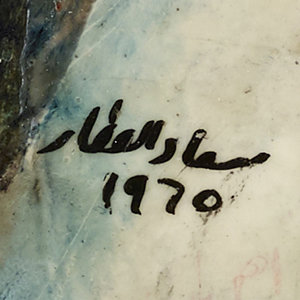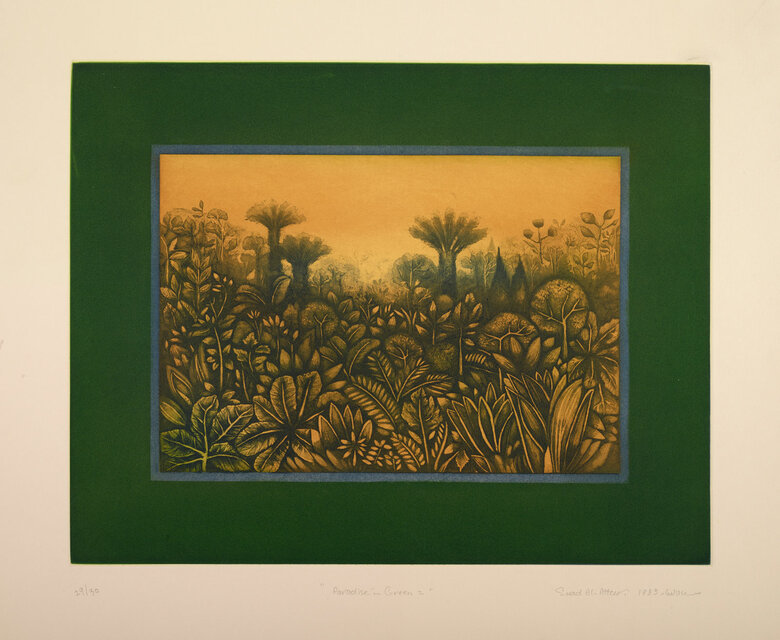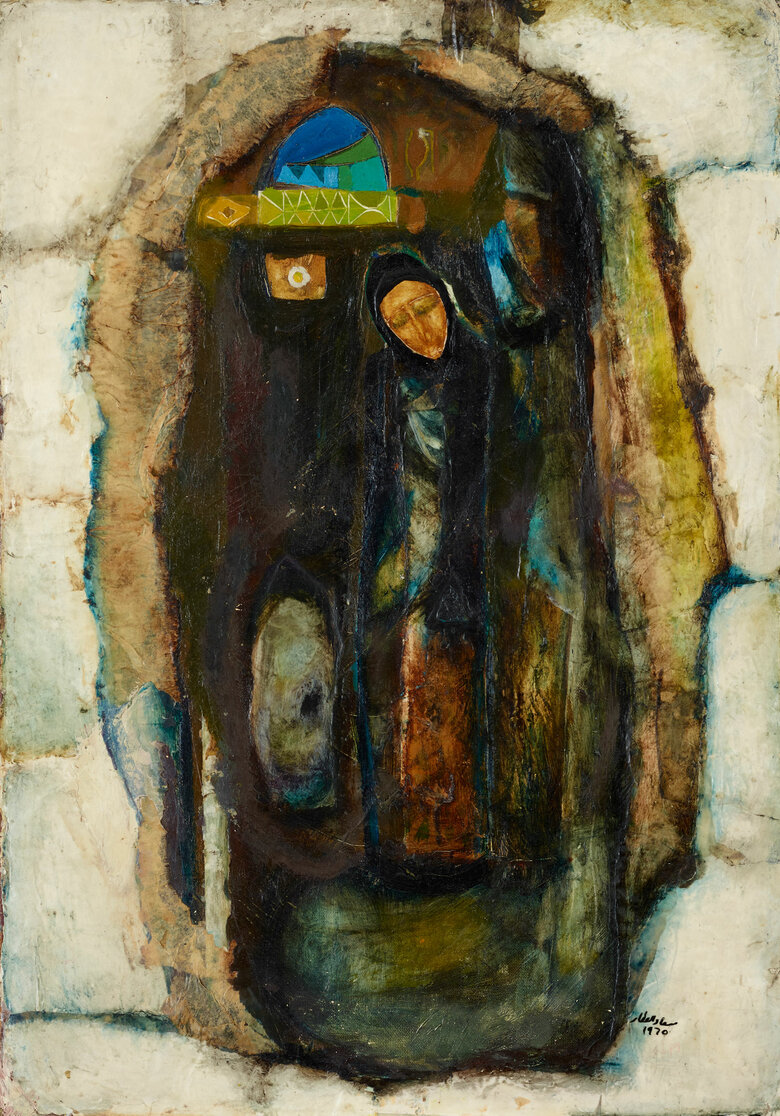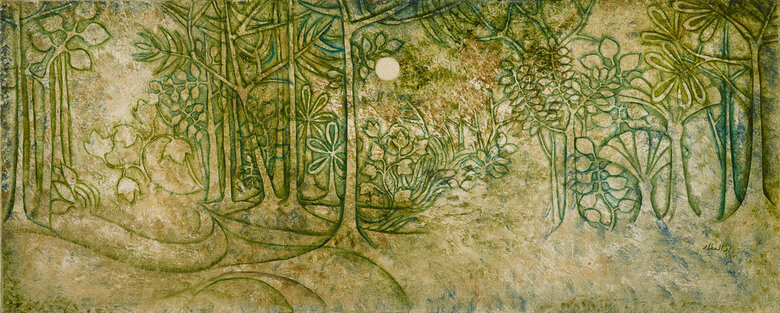Written by Arthur Debsi Suad Al Attar was born in Baghdad in 1942 and came from an artistic family; her mother, Anisa Al Attar (1910-2002) trained in painting in Beirut, Lebanon, and her younger...


SUAD AL ATTAR, Iraq (1942)
Bio
Written by Arthur Debsi
Suad Al Attar was born in Baghdad in 1942 and came from an artistic family; her mother, Anisa Al Attar (1910-2002) trained in painting in Beirut, Lebanon, and her younger sister, Layla Al Attar (1944-1993) was also a painter and director of the former Center for National Art (now Museum of Modern Art in Baghdad). Surrounded by books and works of art at home as she recalled[1], the girl started painting at the age of 8 and quickly received support from her parents who gave her a room converted to a studio where she could practice. During several events in high school, Al Attar used to exhibit some of her artworks, which caught the attention of the renowned painter Jewad Selim (1919-1961)[2]. In the early 1960s, she obtained a degree in Fine Arts from the University of Baghdad – where she would later teach until 1975 – and a diploma from the California State University where she stayed three years. At that time, Iraq was a major hub for art and culture in the region and worldwide, but the presence of women in the field was quite unusual. Yet, when she turned 21 years old, Al Attar progressively gained recognition in the art scene of the city[3]. She contributed to the development of the Baghdad Group for Modern Art and she was also the first Iraqi female artist to hold a solo exhibition in Baghdad in 1965. Simultaneously, she participated in many exhibitions held in Europe and the Middle East, giving Iraq international exposure. In 1976, she moved to London with her husband and children and remained there from then on. There, she completed her training attending post-graduate classes in printmaking and etching at the Wimbledon School of Art and the London Central School of Art and Design.
Fascinated by the predispositions of his daughter Suad to art, Ali Sadiq Al Attar offered her an album of postcards illustrating the artworks of some European artists such as the French painter Camille Corot (1796-1875). Highly inspired by these images, she used to imitate them.
In the Arab world, the 1960s marked a significant stage for graphic art, which is an artistic expression, executed on a flat surface and attaches importance to lines, marks, and printed letters[4]. Indeed, thanks to their previous education abroad, Arab artists familiarized themselves with techniques such as printmaking, etching, or engraving and adopted them when they came back to their home countries. In this decade, Suad Al Attar followed the program of the Baghdad Group for Modern Art and observed the popular environment, which was her main topic. She liked to depict scenes of the daily life of people in Baghdad, markets, and cityscapes. However, she was particularly interested in the representation of the woman and their social issues[5]. Thus, the feminine figure would become recurrent in her oeuvre like in the artwork Untitled (1965), part of the Dalloul Art Foundation. Applying earthy tones of color and a two-dimensional perspective, Al Attar illustrated a veiled woman, standing in what could be a house, and looking at the ground. The artist didn’t want to simply illustrate women but she emphasized conveying their emotions, strength and sorrows. Integrating small decorative motifs, Al Attar immersed the viewer into a spiritual universe, giving these unknown characters a sacred dimension. Here, the position of the woman and the gentleness of her face, recall the canons of iconographic tradition. She even resembles a small statue put in the hollow of a wall that forms the canvas.
In the 1970s, the art of Suad Al Attar reached a stylistic maturity, demonstrated by an innovative and free practice. Using the skills that she acquired from before, she employed mixed media and executed some etching or collages such as in Rêverie au clair de Lune in 1972. In this piece, she showed a new approach of the subject, moving from the life in Baghdad towards a more symbolic painting by integrating imaginary elements, likes the birds in the nest, or the little fairy flying around. After she moved to London, Al Attar felt a deep longing for her homeland and thought that being abroad granted her freedom that was not quite available to her in Iraq; notably, during the regime of Saddam Hussein (1937-2006)[6]. Al-Attar found in painting, a way to express her love and yearning for her country. She celebrated the richness of its history, Mesopotamian mythology with winged creatures, and poetry.
Al Attar came up with a personalized set of symbols that represent various elements of Iraq folkloric visual culture such as the peacock, the rooster, or a horseman. The Iraqi poet and author Jabra Ibrahim Jabra (1920-1994) said about this period: ‘Where the decisive line loses its clarity, the dreams of innocence mingle with the dreams of experience, paradise and desire are interchanged and green trees full of sparrows turn into flames of fire’[7]. In the two etchings called Paradise in Green (1983) and Paradise in Green 2 (n.d.) – both present at DAF –, she celebrated a rich flora in her paintings, through a naïve style. She fully optimized the space of the compositions by superposing the birds, the plants, the flowers, and the trees that she precisely drew. These elements later play a meaningful role in her iconography, and more precisely, her most important element is the date palm. Through this repeated motif, she metaphorically reconnected to the land of Iraq: the etymology of the ‘Tigris’ river stems from a Mesopotamian name for the date palm[8]. Reported to be the oldest cultivated tree, it is associated with the construction of civilizations, both ancient and pre-Islamic. Using the color gold, Suad Al Attar created a dreamlike world like a reference to the paradise lost, namely the Garden of Eden, since the forest represents an image of untouched nature.
The early 1990s were a hard and tragic time for Al Attar who lost her father in 1991, shortly after the Gulf War, and her sister Leila who passed away from an American airstrike on Baghdad in 1993. After she stopped painting for a time, she executed some works with darker scenes in which she would combine painting and Arabic script by adding excerpts of poems. The canvas turned out to be a sort of diary, a creative outlet where she expressed her fear for her family remaining in Iraq.
Suad Al Attar lives and works in London.
[1] “Biography.” Attar, January 29, 2019. https://suadalattar.com/biography/.
[2] Nusair, Isis. "The Cultural Costs of the 2003 US-Led Invasion of Iraq: A Conversation with Art Historian Nada Shabout." Feminist Studies 39, no. 1 (2013): 119-48. Accessed May 4, 2020. www.jstor.org/stable/23719300. [P.145]
[3] Ibrahim Jabra, Jabra. “The Changing Forest of Suad Al-Attar.” in Gilgamesh, A Journal of Modern Iraqi Arts, 1990. [P.7]
[4] Muzaffar, May. ‘In Focus: Graphic Art in the Arab World’ in Lenssen, Anneka, A. Rogers, Sarah, and Shabout, Nada. Modern Art in the Arab World, Primary Documents. New York, USA: The Museum of Modern Art, 2018. [P.372]
[5] Salim, Nizar. Art Contemporain En Irak - Livre I, Peinture. Lausanne, Switzerland: Sartec, 1977. [P.82]
[6] “Suad ALATTAR: Ibrahimi Collection.” Suad ALATTAR | Ibrahimi Collection. Accessed May 6, 2020. http://ibrahimicollection.com/node/110.
[7] Jabra, Ibrahim Jabra in his article ‘The Return from the Unknown Realm’ in Al-Muthaqqaf al-‘Arabi, no.4 (1971), quoted in Salim, Nizar. Art Contemporain En Irak - Livre I, Peinture. Lausanne, Switzerland: Sartec, 1977. [P-82].
[8] ‘July 14 Epic’ in New Iraq, no.10, Bagdad, October 1961.
Sources
Al Arabiya English. “Date Palm, Arab Region Symbol of Prosperity, Listed by UNESCO.” Al Arabiya English. Al Arabiya English, December 11, 2019. https://english.alarabiya.net/en/life-style/art-and-culture/2019/12/12/Date-palm-Arab-region-symbol-of-prosperity-listed-by-UNESCO-.
Collier, Caroline. Suad Al-Attar: Recent Paintings. London, UK: Graffiti Gallery, 1983.
Ibrahim Jabra, Jabra. “The Changing Forest of Suad Al-Attar.” in Gilgamesh, A Journal of Modern Iraqi Arts, 1990.
‘July 14 Epic’ in New Iraq, no.10, Bagdad, October 1961.
Lenssen, Anneka, A. Rogers, Sarah, and Shabout, Nada. Modern Art in the Arab World, Primary Documents. New York, USA: The Museum of Modern Art, 2018.
Nusair, Isis. "The Cultural Costs of the 2003 US-Led Invasion of Iraq: A Conversation with Art Historian Nada Shabout." Feminist Studies 39, no. 1 (2013): 119-48. Accessed May 4, 2020. www.jstor.org/stable/23719300.
Salim, Nizar. Art Contemporain En Irak - Livre I, Peinture. Lausanne, Switzerland: Sartec, 1977.
Suad ALATTAR | Ibrahimi Collection. Accessed May 6, 2020. http://ibrahimicollection.com/node/110.
Suadalattar. “Suad Al.” Attar, January 29, 2019. https://suadalattar.com/.
Qabbani, Nizar, Stewart, Angus, and Bushrui Suheil. Sʻuād Al-Aṭṭār. London, UK: Al-Madad Foundation, 2004.
Youssif, Farouq. “Suad Al-Attar's Secret Garden.” in Gilgamesh, A Journal of Modern Iraqi Arts, 1990.
CV
Selected Solo Exhibitions
2019
Solo Exhibition, Sharjah Art Museum, Sharjah, UAE
2016
Suad al-Attar: In Retrospect, Leighton House Museum, London, UK
2013
Suad al-Attar: Reconstructing the Self, Artspace Gallery, Abu Dhabi, UAE
2011
Tree of Life – Visions from Gardens of Eden, Nour Festival of Arts, Leighton House Museum, London, UK
2010
Solo Exhibition, The British Council, London, UK
2008
The Divine Feminine, Green Art Gallery, Dubai, UAE
2005
Visions of the East, Royal Festival Hall, London, UK
2004
Exhibition of Recent Work, Leighton House Museum, London, UK
2002
Chelsea Art Club, London, UK
2000
Green Art Gallery, Dubai, UAE
1999
Albemarle Gallery, London, UK
1997
Leighton House Museum, London, UK
1993
Leighton House Museum, London, UK
1992
The artist’s studio, London, UK
1989
The artist’s studio, London, UK
1988
The artist’s studio, London, UK
1986
The National Museum of Modern Art, Kuwait
1985
Alif Gallery, Washington D.C, US
1983
Suad al-Attar: Recent Paintings, Graffiti Gallery, London, UK
1981
Suad al-Attar: Etchings and Lithographs, Annexe Gallery, London, UK
1974
Gallery Centre d’Accueil du Proche Orient, Paris, France
1973
The National Museum of Modern Art, Baghdad, Iraq
1972
Gallery One, Beirut, Lebanon
1968
Gallery One, Beirut, Lebanon
1965
Baghdad, Iraq
1957
Baghdad High School, Baghdad, Iraq
Selected Group Exhibitions
2025
All Manner of Experiments: Legacies of the Baghdad Group for Modern Art, CCS Bard, Annandale-On-Hudson, Nrew York, USA
2024
A Home Without Dates Will Starve, Wusum Gallery, Doha, Qatar
Prints and Printmaking, Dalloul Art Foundation, Beirut, Lebanon
2023
Parallel Histories, Sharjah Art Museum, Sharjah, UAE
2022
Memory Sews Together Events That Hadn’t Previously Met,Sharjah Art Museum, Sharjah, UAE
2018
A Century in Flux, Sharjah Art Museum, Sharjah, UAE
2016
The Short Century, Sharjah Museum, Sharjah, UAE
2014
Sky Over The East, Emirates Palace, UAE
2006
Homage to My Land & Dreaming of a Peaceful World, Green Art Gallery, UAE
Tears of the Ancient City, Leighton House Museum, London, UK
2003
Spoleto Art Festival, Italy
Palace Wharf Group Show, London, UK
UNESCO Centre, Jordan National Gallery Collection, Paris, France
The Arabian Canvas, Dubai, UAE
2002
44th International Art Festival of Souza, Tunisia
Global Collection of Art, Ohio, US
24th International Cultural Asilah Festival, Asilah, Morocco
2001
Women of the World, University of Maryland, Washington DC, US
1st International Middle Eastern Paintings, Sotheby’s, London, UK
2000
Women of the World, New York, US
Writing Arabic, British Museum, London, UK
Flint Institute of Art, Michigan, US
1999
Riverside Studios, London, UK
1998
Kelling Festival, Norfolk, UK
230th Summer Exhibition, Royal Academy of Art, London, UK
1997
ART 97, Red Dot Gallery, London, UK
1995
Forces of Change, Atlanta, Georgia, and Los Angeles, US
1st International Art Biennial of Malta, Malta
Treg Aquarelle, Salon International de la Peinture à l'Eau, Trégastel, France
1993
225th Summer Exhibition, Royal Academy of Arts, London, UK
1992
1st International Art Festival, Al-Mahris, Tunisia
1991
223rd Summer Exhibition, Royal Academy of Arts, London, UK
1989
Contemporary Art from the Islamic World, Barbican Centre, London, UK
1987
Mall Galleries, London, UK
1986
Arab World Institute Exhibition, Grand Palais, Paris, France
1985
Homage to Picasso & Miro
International Art Exhibition, Madrid, Spain
International Biennial of Graphic Arts, Taiwan
International Print Biennial, Krakow, Poland
II Cabo Frio International Print Biennial Exhibition, Brazil
1984
51st Exhibition of the National Society of Painters, Sculptors, and Printmakers, Mall Galleries, London, UK
1st International Biennial Exhibition, Cairo, Egypt
International Print Biennial, Miami, Florida, US
Contemporary Arab Artists, Tunisia
1982
Museum of Modern Art, Amman, Jordan
6th Norwegian International Print Exhibition, Fredrikstad, Norway
Exhibition of Contemporary Art, Ottawa, Canada
1981
Asilah Art and Culture Festival, Asilah, Morocco
1980
Third World Biennial of Graphic Art, London, UK; Baghdad, Iraq
Exhibition of Women Artists, Rome, Italy
1978
Contemporary Art Exhibition, New York, US
The Stowells Trophy Competition, Royal Academy of Arts, London, UK
1976
The International Cagne-Sur-Mer Exhibition, France
1975
Contemporary Arab Art Exhibition, Algeria
1974
Triennial of International Art, New Delhi, India
Awards and Honors
1999
Award of Excellence, CIB Award, Paintings for the Holland Park
1998
Opera House
1998
Honorary Award, Sharjah Ladies Club, UAE
1995
Award of Distinction, 1st International Biennial of Malta, Malta
1993
Featured on the UNICEF New Year Card
1985
Honorary Award, II Cabo Frio International Print Biennial Exhibition, Brazil
1984
Gold Medal and 1st Prize, International Biennial, Cairo, Egypt
Miro Award (1st Prize), Homage to Picasso & Miro Exhibition, Madrid, Spain
1978
Honorable Mention, Third World Biennial of Graphic Art, London, UK
1975
Featured on the UNICEF New Year Card
1973
Honorable Mention, Interpress Agency International Contest, Poland
Collections
The British Museum, London, UK
Gulbenkian Collection, Barcelona, Spain
Gandhi Private Collection
Jordan National Gallery of Fine Arts, Amman, Jordan
Museum of Modern Art, Damascus, Syria
Asilah Museum of Art, Morocco
Museum of Modern Art, Kuwait
Conference Center, Qatar
National Museum of Modern Art, Baghdad, Iraq
Beit Al Quran Collection, Bahrain
Ramzi and Saeda Dalloul Art Foundation, Beirut, Lebanon
Barjeel Art Foundation, Sharjah, UAE
Mathaf: Arab Museum of Modern Art, Doha, Qatar
Ibrahimi Collection, Jordan
Musée du Montparnasse, Paris, France
Leighton House Museum, London, UK
Documents
Iraq’s Past Speaks to the Present
The British Museum, English/Arabic
Exhibition Catalog
The Iraq’s Past Speaks to the Present: Contemporary Art from Iraq and Syria at the British Museum
Gemma Tully
contemporarypractices, English
Exhibition Review
Suad Al Attar
Graffiti Gallery, English/Arabic
Exhibition Catalog
The Characteristics of Magical Realism in the Work of the Iraq Artst Suad Alttar and the Egyp Tian Artist Zainab AL-Sijini سمات الواقعية السحرية في اعمال الفنانة العراقية سعاد العطار والفنانة المصرية زينب السجيني
Maha Saleem
Journal of University of Babylon for Humanities, Vol.(27), No.(2), English/Arabic, 2019
Essay
سعاد العطار
جبرا إبراهيم جبرا
Al-Amaloun fil-Naft العاملون في النفط, Arabic, 1972
Article
Press
سعاد العطار عراقية تنسج الحلم الأسطوري
سعد القصاب
almadasupplements.com, Arabic, 2017
التشكيلية العراقية سعـاد العطار.. رائحة الأساطير الحالمة غـازي انـعـيـم
ناقد تشكيلي اردني
adserver.addustour.com, Arabic, 2007
سيبقى طيف بغداد يحرك الوجدان والريشة والألوان
startimes.com, Arabic, 2003
!سعاد العطار صارت رسامة وهي في السادسة . فنانة عربية حالمة "تصنع" السلام باللون والريشة
almadasupplements.com, Arabic, 2019
رحلة الى داخل سعاد العطار .. حزن الغربة يولد فنا
لولوة الحمود
archive.aawsat.com, Arabic, 2003
سعاد العطار.. علامة فارقة في المشهد التشكيلي العربي
إسماعيل الرفاعي
albayan.ae, Arabic, 2007
بعد التعتيم الإعلامي..بيت (المدى) يحتفي بـ""فراشة"" التشكيل العراقي سعاد العطار
محمد الكروي
asrar7days.com, Arabic, 2019
سعاد العطار وليلى العطار.. من اقطاب الفن
د. كاظم شمھود
almothaqaf.com, Arabic, 2018
سعاد العطار عراقية تنسج الحلم الأسطوري
سعد القصاب
alarab.co.uk, Arabic, 2016
الفنانة التشكيلية سعاد العطار و(شجرة الحياة) العراقية
artsgulf.com, Arabic, 2012
الكتابة مشروعها المقبل . الرسامة سعاد العطار ترثي بغداد بألوان نارية
غالية قباني
sauress.com, Arabic, 2010
SUAD AL ATTAR Artwork
Become a Member
Join us in our endless discovery of modern and contemporary Arab art
Become a Member
Get updates from DAF
Follow Artists
Save your favourite Artworks
Share your perspectives on Artworks
Be part of our community
It's Free!
We value your privacy
TermsCookiesPrivacy Policies
Become a Member
Get updates from DAF
Follow Artists
Save your favourite Artworks
Share your perspectives on Artworks
Be part of our community
It's Free!
We value your privacy
TermsCookiesPrivacy Policies
Become a Member
Get updates from DAF
Follow Artists
Save your favourite Artworks
Share your perspectives on Artworks
Be part of our community
It's Free!
We value your privacy
TermsCookiesPrivacy Policies
Welcome to the Dalloul Art Foundation
Thank you for joining our community
If you have entered your email to become a member of the Dalloul Art Foundation, please click the button below to confirm your email and agree to our Terms, Cookie & Privacy policies.
We value your privacy, see how
Become a Member
Get updates from DAF
Follow Artists
Save your favourite Artworks
Share your perspectives on Artworks
Be part of our community
It's Free!
We value your privacy
TermsCookiesPrivacy Policies







_SuadAlAttar_Front.jpg)

